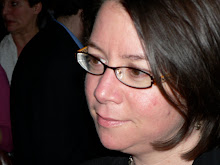J: I don't like to do spelling.
R: Why not?
J: I want to have an exciting surprise, which will be to get all the words right with no practice.
R: Hm. The thing is, the way you get good at things is to practice.
J: Not everything!
R: What isn't like that?
J: Math. I just know how to do it right away. So it's fun to do it right away, and then I keep doing it so I keep learning more and more. I don't have to work, I just learn it without working.
I have sympathy for this position - enough so that I find myself conflicted about enforcing the spelling drills. Math is fun for him and yes, learning should be fun right away. Or if it's not fun right away, you should have an age-appropriate sense of purpose about the activity, like he does with soccer drills. The way we teach spelling in this day and age does not engage a kid's intelligence: it's just "this way is right, that way is wrong, memorize it." Not only is it boring, it sets you up for failure (because let's face it, spelling in English is unpredictable). Maybe this rote-learning approach is the best way to teach spelling, but I doubt it. After all, a lot of math that used to be taught by rote is now taught as intelligent work.
By chance I was reading Eleanor Duckworth's "The Having of Wonderful Ideas" yesterday. She had a helpful statement about why we learn spelling: standardization makes written communication more fluent. It helps us give all our attention to what is being said, rather than being distracted by aspects of how it was said. Is that a sense of purpose that is offered to kids in school? I doubt it. You just "have to," maybe so that people won't think you're an idiot. And, okay, that's important too, but doesn't explain why we place such value on standardization.
Duckworth points out that the details of writing are really very confusing. You're supposed to write the letter "C" a certain way, and if kids write it backwards we chastise them. But at the same time, they're learning what a square is, and they're supposed to identify it as a square no matter whether it's on its side or balanced on its point or large or small or whatever. She says (of a certain child),
He is meant to be intelligent when he deals with squares, moving them around and looking at them in all sorts of ways, but he is severely restrained from being intelligent in dealing with letters.She goes on to offer a variety of options for letting children explore alternatives in both spelling and grammar, instead of trying to force them to only use the correct forms.
I thought of another reason to learn standard spelling, which I think I remember being highlighted by the main character in Bee Season (a great book): The spelling of words speaks volumes about the word's (and thus the concept's) history and origins. I tried this out on Jordan this morning by talking about the word "pizza." He thought about a variety of ways that one might spell it: the long-e sound could be either "ee" or "ea," he said, and he thought the middle consonant ought to be "ts." I told him how actually, the vowel is "i" and the middle consonant is "zz," and the reason for that is that we learned to make pizza from people in Italy, and in Italian, the long-e sound is made with an "i" and the "ts" sound is made with a "zz." So even though the spelling seems sort of crazy, we keep it, because looking at the word reminds us that we got pizza from Italy.
I don't know how much impression any of this made, but it helped me feel better, which I think is actually worth something.

No comments:
Post a Comment